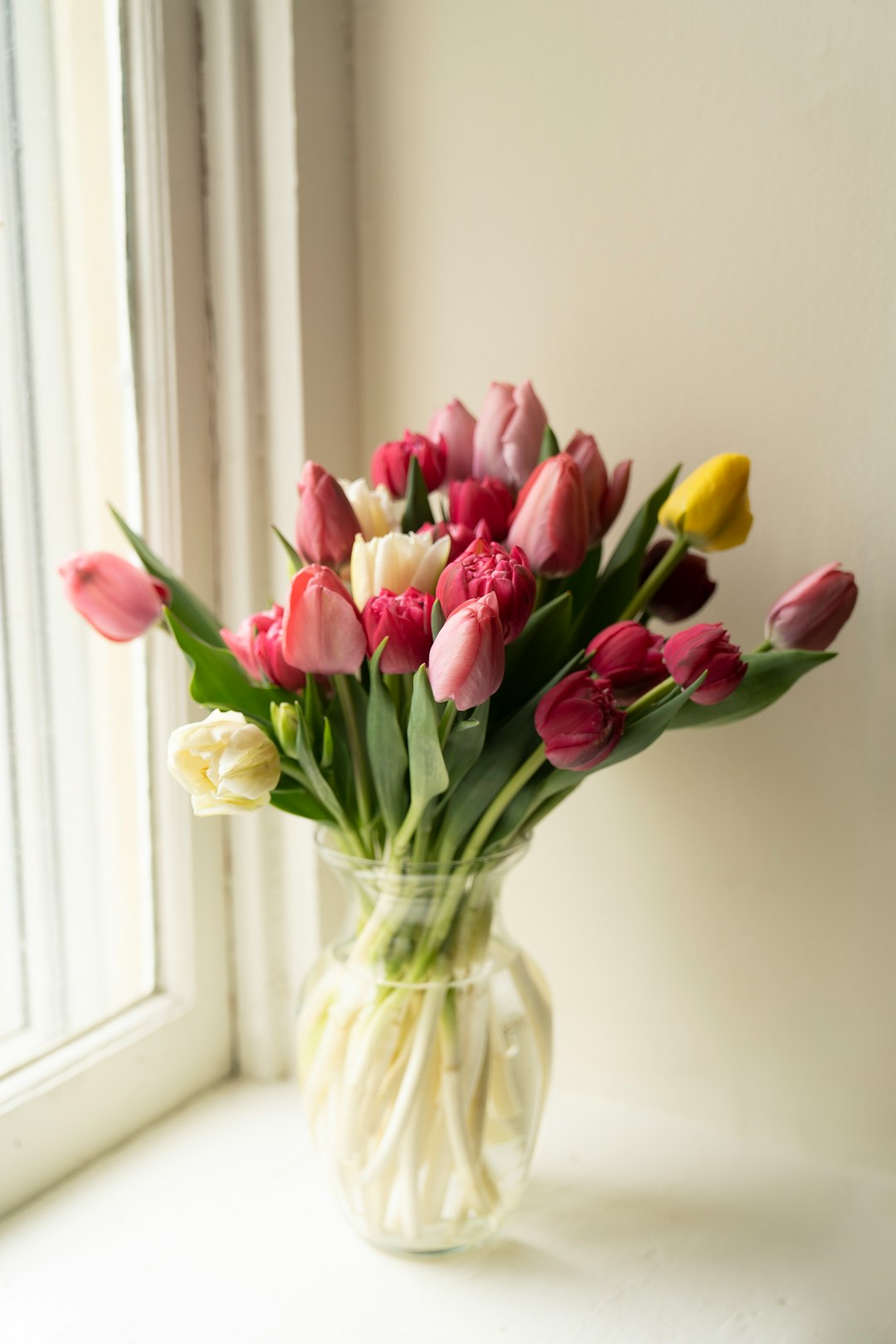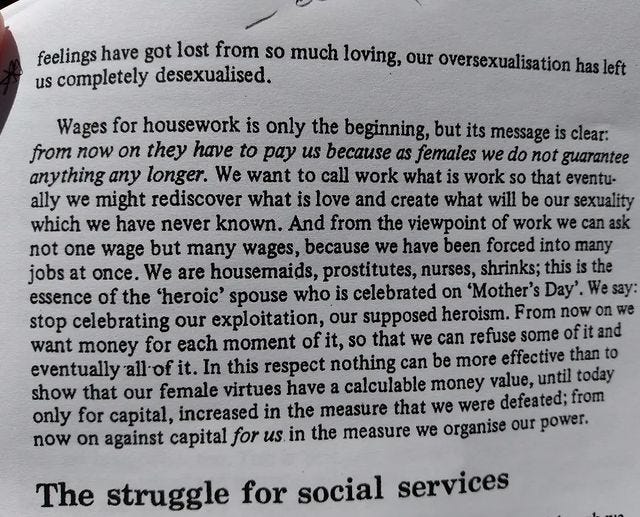Every year, I post roughly the same thing on social media for Mother’s Day—a few lines about how the holiday fails to provide any meaningful support to mothers or parents, who are so obviously struggling under the weight of a system designed to exploit our labor and call it “love.”

Looking back at my IG archive, I see I posted nothing last year, and for that I’m inordinately proud. I guess I was off enjoying myself, though I can’t remember exactly what I did with my family. I did, however, post part of an essay by Silvia Federici last May, just a few days before the “holiday.”
It remains a perfect rallying cry for mothers today:
I think my new tradition will be to post this paragraph every year.
The pressure to produce Mother’s Day content didn’t really get to me. I decided not to push out a longer essay this week—I had a conversation planned for the newsletter this week (it’s still coming, the author just needed a few more days, and it’s going to gooood!)—but rather than scramble to get something thematic together, I thought, nope. A few times over the past couple weeks I did feel a sneaking anxiety—that I should have pitched some essay about moms to various media outlets months ago.
There will likely be many great essays (and terrible ads) rolling out over the next few days, pieces on the state of motherhood and parenthood in America today—which is a dismal state, to be clear, and not only because paid leave, affordable childcare, basic income, and universal healthcare are still not secured, but because we are in a new, post-Roe era in which pregnant people have lost the right to basic healthcare and full citizenship under the law.
Not only are the conditions of parenthood in America far from ideal, many people will be forced into parenthood this year against their will— a cataclysmic, traumatic, and violent process that will alter their bodies and minds forever.
But this is my beat all the time, and it seemed silly to let a holiday that is supposed to be for “me” stress me out further. Instead, I’m sharing some good stuff, mostly by other people, that honors how much we’ve abandoned caregivers in this country, while also not totally depressing you.
One great piece on motherhood is already up at The Cut. It’s by
of , whose work I love, and it's cheating, sort of, because the fire in the essay is all Sarah, but she also generously cites TOUCHED OUT throughout, exploring connections I’ve been digging into over the years—such as the desire to be unruly and ungovernable, NOT what a mother or woman is supposed to be, while also not destroying ourselves in the process:Amanda Montei, author of the forthcoming Touched Out: Motherhood, Misogyny, Consent and Control, describes a perfect storm of conditions leading to today’s mothers seeking out “the unruly or ungovernable.” In her book, Montei sheds light on the trend that Dr. Abrams observes by explaining that, “Today, women who become parents are expected to study and perform ideal motherhood at the cost of all else by consuming online parenting content to meet their children’s needs with monkish detachment.”
But, according to Montei, it’s not just this swing toward intensive parenting, documented in places like Ariel Levy’s New Yorker story on the “gentle parenting” movement — which almost brought me to tears with its validation of my own sense of erasure under the guise of responsiveness to my children — that is bringing the suffering of mothers to a head. It’s also the Me Too movement and revisiting our own difficult histories with consent. It’s the cultural conversations challenging the institutions of motherhood and marriage, calling out domestic inequality. It’s the war on women’s bodies that the Dobbs decision made more visible. It’s the pandemic-fueled realization that no one gives a shit about us or the children we are trying to raise. Mothers are tired. Tired of the particular flavor of American motherhood being doled out, but also tired of fighting so many battles both in and out of the home, just to assert our existence.
Montei offers a simpler version of this take, too: “A lot of women are for the first time realizing that they never really asked themselves what they wanted.”
It’s thrilling to see this book—which I labored over alone and in agony for many years— already starting new conversations about motherhood. Sarah weaves in the stories of so many other mothers who are “going wild” in all sorts of ways. In TOUCHED OUT, I write a lot about the informal sexual education I had at the hands of young boys and men, and about the hard dark place I entered years later, as a new mother, when I wanted to push that world away AND hold on to the life I ended up with.
But the thing is, these are not unique experiences.
Nearly every woman I know carries trauma—or at the very least, utter discomfort and confusion—about her early sexual life. We carry this into parenthood.
Sarah connects her own early sexual life with feelings that came up for her as a parent:
After a lifetime of accommodating others — dampening my emotions so as not to be “too intense,” faking my orgasms — figuring out what I wanted was a daunting assignment. But as I watched other women around me model it, as people like Montei gave language to my experience and permission to imagine more for myself, my desires began to come into relief. I wanted to parent less intensively, to share the housework and mental load. But I also wanted to heal the trauma created by years of giving my body over to others — first, the high-school boys who had little concern for my desires, then, my husband and children. And also, I wanted to be ungovernable. But I didn’t want to leave my marriage or my children. I wanted it all.
I also love this synthesis of what’s happening around the discourse on motherhood now:
There is an emerging trend in the world of parenting advice that seems to view maternal self-assertion as critical to good parenting. In Essential Labor, Angela Garbes gives us a vision of motherhood that takes it all seriously but is not precious, that is thoughtful but unapologetic. In The Breaks, Julietta Singh shows us how to mother from a place that views maternal identities not as in conflict with, but as fundamental to parenting choices. KC Davis wants mothers to stop worshiping cleanliness and order as signs of a happy home, but instead to create spaces that function better for who we actually are. Amanda Montei believes in the proliferation of maternal narratives as a way to fight back against a culture that desperately wants to pigeonhole mothers and pit them against each other.
The Wild Moms continue to inspire me and to defy categorization.
If you’re a mom, stay wild out there this weekend.



